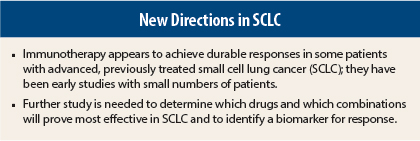Early data on immunotherapy for small cell lung cancer (SCLC) have been encouraging. SCLC may catch up to non–small cell lung cancer (NSCLC), where immunotherapy is now standard of care, if these early data are borne out in phase III trials.
Phase Ib and II studies of immunotherapy in SCLC were presented for the first time at the 2015 ASCO Annual Meeting and selected for the recent Best of ASCO® meeting in Boston, where Sarah B. Goldberg, MD, MPH, of Yale Cancer Center, New Haven, Connecticut, discussed the findings.1,2
“Chemotherapy is the mainstay of treatment for small cell lung cancer. Selected patients are treated with prophylactic cranial irradiation. Topotecan is the standard second-line treatment and is approved by the [U.S. Food and Drug Administration],” she noted.
“There have been no practice-changing advances in a long time. Now it seems that immunotherapy may change that, with studies of pembrolizumab [Keytruda] and nivolumab [Opdivo] with or without ipilimumab [Yervoy],” Dr. Goldberg told listeners.
KEYNOTE-028
Pembrolizumab was generally well tolerated and has promising antitumor activity in patients with programmed cell death ligand 1 (PD-L1)–positive extensive-stage SCLC who have had disease progression on prior platinum-based chemotherapy, according to the preliminary results of KEYNOTE-028, a phase Ib study with multiple cohorts and multiple diseases.1 The study was presented at the Annual Meeting by Patrick Ott, MD, PhD, of Dana-Farber Cancer Institute, Boston.
Of 157 patients with SCLC screened, 42 had PD-L1 expression of at least 1%. All patients in the SCLC cohort either had treatment failure on, or were not candidates for, standard chemotherapy. Autoimmune disease was an exclusion criterion.
If at least a partial response was achieved, patients were slated for pembrolizumab therapy for 2 years or until disease progression. Only 20 patients went on to treatment with pembrolizumab.
“Patients with SCLC tend to be sicker than patients with NSCLC, often with brain metastases and declining performance status,” Dr. Goldberg said. “Waiting for PD-L1 status test results can take several weeks, and waiting can be challenging for these patients,” she added.
Overall, pembrolizumab was well tolerated at 21 weeks. One treatment-related death due to colitis was reported, and no cases of pneumonitis occurred.
Of the 20 patients, 7 responded, for a response rate of 35%; all were partial responses. Several patients had stable disease, and 45% had progressive disease.
Median time to response to pembrolizumab was 8.6 weeks. Many responses are ongoing, with 6 out of 7 responding out to 40 weeks.
“This is encouraging for SCLC after relapse,” Dr. Goldberg noted. No survival data are available. Enrollment in the SCLC cohort of KEYNOTE-028 is continuing, and further results are awaited.
Nivolumab With or Without Ipilimumab
Deep and durable responses achieved in melanoma have led to study of nivolumab with or without ipilimumab in SCLC. A phase I/II study of recurrent SCLC after one line or more of prior therapy has shown encouraging preliminary results.2 The data were originally presented at the Annual Meeting by Scott J. Antonia, MD, PhD, of Moffitt Cancer Center, Tampa, Florida.
The study enrolled patients with progressive disease regardless of PD-L1 status or the number of prior chemotherapy regimens. Patients were treated with nivolumab at two different doses (n = 40), and combination nivolumab/ipilimumab was given at various dose levels (n = 35).
“Many of these patients were heavily pretreated. They had to have had at least one prior regimen, but about 60% had two or three prior lines of therapy,” Dr. Goldberg said.
The rates of grade 3 and 4 toxicity were higher with the combination than with nivolumab monotherapy.
“Looking at the fine print, limbic encephalitis was reported in two patients and resolved in one; grade 5 myasthenia gravis was reported in one patient and was fatal,” she said.
Among 40 evaluable nivolumab recipients, the overall response rate was 18%. There were no complete responses, and the partial response rate was 18%. The rate of stable disease was 20%, and the disease control rate was 38%.
In 46 evaluable patients on the combination arm, the overall response rate was 17%, complete response rate was 2.2%, partial response rate was 15%, stable disease rate was 37%, and disease control rate was 54%. Duration of response has not yet been reached for nivolumab at this early time point.
“The changes in tumor burden are exciting for patients who do respond,” Dr. Goldberg commented.
For this study, PD-L1 expression was not a requirement. However, patients who were PD-L1–positive did respond, as did PD-L1–negative patients.
“These are still early days for immunotherapy in SCLC. It appears that PD-L1 expression may be useful but is not necessary for response,” Dr. Goldberg said.
Encouraging but Not Definitive Data
“These data are extremely encouraging for heavily pretreated patients with SCLC. Response rates were 35% for pembrolizumab in PD-L1–positive patients, 17% for nivolumab monotherapy, and 18% for nivolumab plus ipilimumab in all comers. Several responses appear to be durable. These are all phase I studies, and it is still too early to determine if the combination is better than single-agent therapy,” Dr. Goldberg said.
“Toxicity may be related to paraneoplastic syndromes in some cases, which require close monitoring and aggressive treatment if they occur. The biomarker issue is up in the air. It is challenging to identify a biomarker, especially in SCLC, in part because the biopsy samples we are able to obtain are often very small. It is sometimes difficult for sick patients to wait for their PD-L1 status,” she continued.
“Immunotherapy is not standard of care for SCLC, as it is for NSCLC. I will be actively seeking trials of immunotherapy for my SCLC patients, so these data change my practice in that regard. Ongoing trials are conducted to study pembrolizumab, nivolumab, and ipilimumab in SCLC,” Dr. Goldberg said. ■
Disclosure: Dr. Goldberg has received research funding from AstraZeneca.
References
1. Ott PA, Fernandez MEE, Hiret S, et al: Pembrolizumab (MK-3475) in patients with extensive-stage small cell lung cancer (SCLC): Preliminary safety and efficacy results from KEYNOTE-028. 2015 ASCO Annual Meeting. Abstract 7502. Presented May 30, 2015.
2. Antonia SJ, Bendell JC, Taylor, MH, et al: Phase I/II study of nivolumab with or without ipilimumab for treatment of recurrent small cell lung cancer (SCLC): CA209-032. 2015 ASCO Annual Meeting. Abstract 7503. Presented May 30, 2015.



